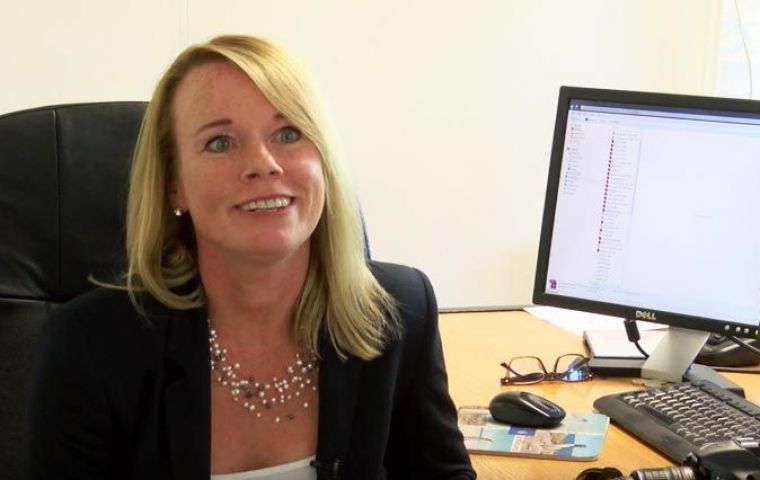MercoPress. South Atlantic News Agency
“Politicians keep us apart”: Insights from Lisa Watson, editor of the Falklands' Penguin News
 “When I meet people from Argentina, I always think it would be so easy to understand each other... However, it's a political issue and it's the politicians who keep us apart,” Watson stated.
“When I meet people from Argentina, I always think it would be so easy to understand each other... However, it's a political issue and it's the politicians who keep us apart,” Watson stated. In an interview with Argentine media outlet DEF, Lisa Watson, the general editor of the Penguin News, the sole newspaper in the Falkland Islands, shared her perspectives on the relationship between Argentina and the islanders, potential oil exploitation, and recent developments in the archipelago. Watson, born and raised in the Falklands, offers a unique viewpoint shaped by her personal and professional experiences
Watson's reflections are particularly poignant regarding the strained relationship between the Falklands and Argentina. She emphasized the role of politics in maintaining the divide between the two communities. “Politicians keep us apart,” Watson asserted. “When I meet people from Argentina, I always think it would be so easy to understand each other... However, it's a political issue and it's the politicians who keep us apart.”
She noted that current relations between Argentina and the Falklands are more ideological than grounded in state policy or national interest. “Yes, absolutely,” Watson said when asked if relations are ideologically driven. “Sometimes I feel that it is in the interest of Argentine politicians to keep Argentines separated from the Malvinas Islands. It is not in the interest of the government of the islands.”
Watson's personal history and professional journey give her a deep understanding of the economic and social changes in the Falklands. She recalled the traumatic experiences during the 1982 conflict, when her family's farm was a key location during the Argentine invasion. Post-war, Watson benefitted from British support for the islanders, studying English literature in Wales before joining Penguin News in 1999 and becoming its editor the following year.
Discussing the economic growth driven by fishing licenses and potential offshore oil exploitation, Watson highlighted the complexities these developments bring. “For the Islands, it was always controversial, because talking about oil causes us political problems,” she explained. “As soon as the subject comes up, Argentina starts to be more aggressive towards us.”
Watson acknowledged the environmental concerns tied to oil exploitation, noting it has become a more contentious issue over the past two decades. “Personally, I am on the side of the environment,” she said. “But any country or territory is going to feel the benefit of having a stronger economy. It's going to make us feel more independent and more confident.”
Infrastructure development is another area where the Falklands have seen significant progress. Watson described the expansion in housing and the planned construction of a new power station. “For example, you will see an increase in the number of houses. West Stanley is brand new,” she said. “There is the intention to build a new power station. That's the next big capital project.”
However, Watson pointed out the persistent challenges of living in an isolated area, such as the high cost of imports and shortages of human resources. “There are always shortages and there is the impact of the cost of transporting any product to an island,” she remarked. “Another problem is the lack of human resources. For example, we have good workers locally, but not enough.”
Reflecting on the potential for improved relations with Argentina, Watson expressed a desire for greater understanding between the people of both regions. “When I talk to Argentines, they are always very surprised by the reality of the islands. It is as if a veil is lifted and there is an understanding,” she observed.
Ultimately, Watson's insights underscore the significant role that politics plays in shaping the relationship between the Falklands and Argentina. Her belief that “politicians keep us apart” highlights the ideological barriers that persist, despite the potential for mutual understanding and cooperation at a personal level.




Top Comments
Disclaimer & comment rulesCommenting for this story is now closed.
If you have a Facebook account, become a fan and comment on our Facebook Page!